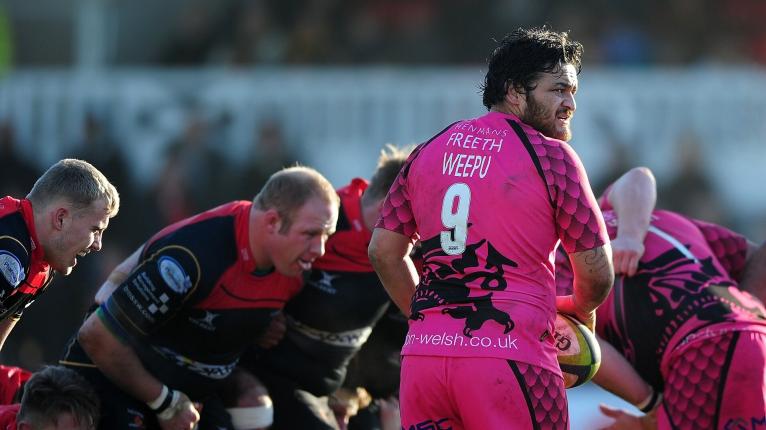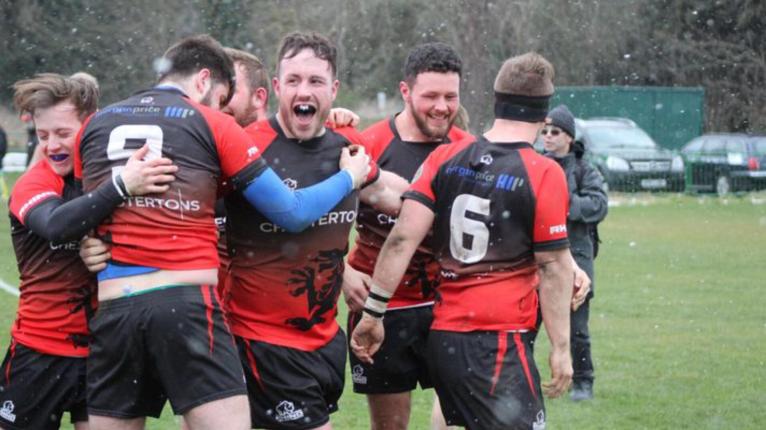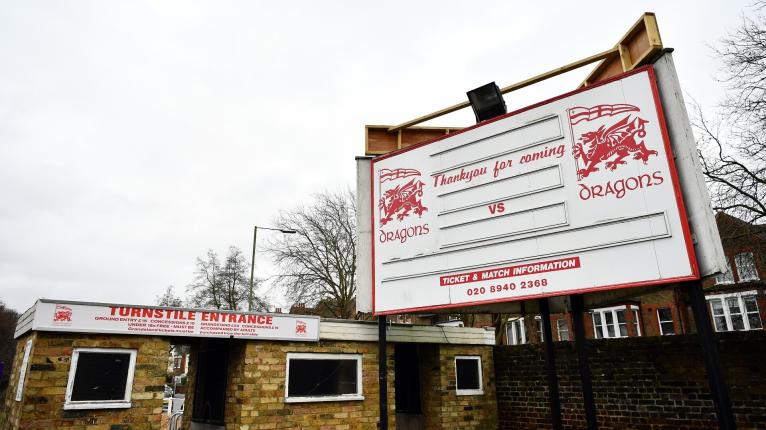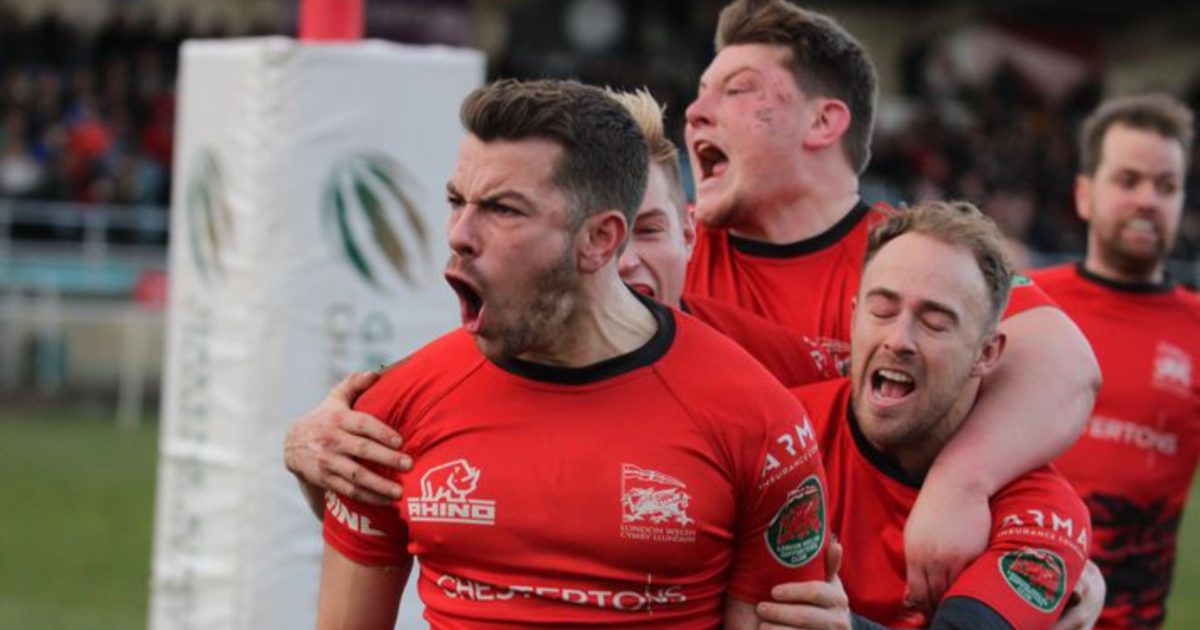Three successive promotions, a 94% win rate and a bizarre 0-0 draw: How liquidated London Welsh fought back from oblivion

The gates at London’s Old Deer Park, that scenic green space surrounded by the banks of the Thames and Kew Gardens, were apparently slammed shut for a while the other week. Seemingly too many dog walkers were refusing to clean up the poop their pets were making.
S*** hitting the fan in this area was nothing new, though. It was December 2016 when London Welsh, the famed exiles club whose pitch has Kew’s landmark pagoda as a picturesque backdrop, went into voluntary liquidation. The legacy of a disastrous 2015 Premiership relegation ultimately proved too much of a burden for an ailing bottom line where spendthrift habits were encapsulated by the recruitment of World Cup-winning All Black, Piri Weepu.
Within a month of liquidation Welsh were booted out of the Championship, the RFU declaring that the club’s second-tier position was untenable after it failed to convince it had a sound future financial footing. For a club that had swaggered through the Swinging Sixties and the early Seventies with a cutch of swashbuckling Wales and Lions stars, the likes of John Dawes, JPR Williams, Gerald Davies and John Taylor, their January 2017 expulsion was a sickening blow.
It somehow didn’t sound the death knell, however. Rather than attempt to re-form a new professional team, they opted to instead focus all efforts on their already existing amateur set-up and what has unfolded has been heart-warming, three successive promotions after they dropped all the way down to level nine status in the Herts/Middlesex 1 League.
Masterminding this phoenix from the flames revival is Cai Griffiths, the grizzled Celtic League-winning prop of Ospreys origin. He had a taste of the London club’s professional era culture, packing down for Welsh during their 2013/14 Championship-winning campaign. A text from Sonny Parker amid the liquidation fall-out three years later next piqued his interest, that invitation for a casual coffee becoming the catalyst for a colourful adventure around the highways and the byways of the English capital’s grassroots leagues.
Bank Of England, Hendon, Old Actonians, Staines, Harrow, Cheshunt, Kilburn Cosmos, Verulamians, Chiswick, Hammersmith & Fulham, Letchworth, Welwyn… they are not the names of rugby clubs that readily roll off the tongue of an ex-professional player. However, after a dozen seasons earning his wage at the ruthless front row coalface, the 36-year-old is revelling in the surreal experience of seeing out his playing days as an amateur level second row who now doubles up as the club’s director of rugby.
“When I took over I had to Google where these clubs were,” he jested to RugbyPass. “I wasn’t sure if they were in London or not. It’s class, though. I haven’t been used to this. The games outside the M25 we will get a (team) bus to it, but I really enjoy jumping on the tube, getting to a stop and then getting on a bus heading to the game.
“It really brings you back to an old-school mentality. I used to do it as a kid, jumping on a bus to get to a club, jumping on a bus to get to an away fixture. Public transport is part and parcel of living in London and being in the London leagues. I quite enjoy that but I had to Google the majority of the clubs because I wasn’t too sure where they were.
“You need to understand where we are as a club. We’re not massive at the moment where we would get (team) buses everywhere, but the boys have been great. If you’re on a tube on the Piccadilly line, it’s always going to be delayed to a point anyway. That’s just the joys of living in London. For us, it’s down to the standards of the players and I have hardly had anyone turning up late, but it’s an adjustment.”

One that has worked out swimmingly so far. When Griffiths first shot the breeze with Parker three years ago not long before the Kiwi headed away back to New Zealand, he learned that the rejuvenation plan was for four promotions in five seasons. They’re firmly on track towards meeting that target, wracking up three successive promotions with their Herts/Middlesex 1, London 3 NW and London 2 NW titles. It’s a progression that has featured 58 wins in 62 matches, but there have been some memory-making curveballs.
Within weeks of their introduction to level nine rugby in the English league pyramid structure, Welsh were left with a bloody nose at West Hampstead, ambushed by USC Old Boys. The soul searching that ensued has become a once-a-year habit under Griffiths, Welsh similarly upset at Stevenage and Fullerians in subsequent campaigns.
“We have had three wake-up calls,” he reflected. “But you should have seen the pitch (at USC)? It was horrible. We learned a lot after that loss. We knew we weren’t invincible, but we had a look at a couple of things to go forward. We have only lost three games, but it [losing] gives you a time to reflect on the way you are going. No bones about it, we’re sort of everybody’s cup final home and away so we have to be on our mettle each game.
“Being in the jersey carries a burden. Yes, we are London Welsh and there is the tradition of the club, all the history and playing at Old Deer Park, but it comes with the burden that each game is a cup final against us. But saying that, over three years it’s a 94 per cent win rate. We’re happy with that. To go three years on the bounce without a loss would have been quite a big ask.”
https://www.instagram.com/p/BwPcNuBn41L/
Fifty-eight wins and three defeats add up to 61 matches, one short of the 62 played. What gives? An incredible 0-0 draw on Hackney Marshes against Old Streetonians. It was quite the caper, a scoreless event that spooks Griffiths to this day. “That day the rain was sideways. It’s was pouring and it was horrific. It was just one of those days. Knock-on, scrum, collapse, reset, defence, scrum, knock-on. We had an incident which I still kick myself where we had a five-metre scrum. We got a penalty and were going for another push-over scrum instead of kicking for the goal. That was my fault. It haunts me a bit.”
It’s a minor complaint, though, given the enormous project being undertaken to breathe fresh life into a club that had its fire extinguished. The contrast between professionalism and amateurism is night and day for Griffiths, the Championship liveried post protectors they still use at Old Deer Park probably the only carry over from then and now.
“When I was there first (in 2013) we were full-time professional, Monday until Saturday as a normal working week in a professional environment. We’d be training at Old Deer Park Monday, Tuesday, Wednesday, Thursday off, then a team run Friday and played Saturday.
“We’d a gym onsite, everything was full-time, but the issue was we were playing in Oxford to be eligible to play in the Premiership. That had its own downfalls… but we won the Championship that year and the team went up to the Premiership, but I left to go back to the Ospreys.

“Coming back at the start of 2017/18, it was completely amateur. We were training Tuesday and Thursday night. I was quite lucky that Sonny was there in the transition. He was team manager in 2017 when it was professional and then (initially) stayed on a director of rugby with the amateur side.
“The difference was we didn’t have a gym, didn’t have supplements deals, didn’t have anything that was there for the professional side. Boys were working elsewhere full-time and were coming to training on Tuesday and Thursday like it is at any amateur rugby set-up.
“We only got the boys for three hours training a week. That adjustment was quite hard, quite challenging. Tuesday, Thursday and then a game on a Saturday. It was challenging, but the bonus was we came back to Old Deer Park and were playing all our home games there.
LONDON WELSH PROMOTED
?Year 3 of the 5 year plan
?3rd successive promotion
?We move on to the next ….
LONDON WELSH ARE COMING #lwfamily#joinourjourney pic.twitter.com/gMkmN0xNbB
— London Welsh RFC ?? (@LondonWelshRFC) April 3, 2020
“Go up to the rooms and you have got all the Lions shirts up there. It has that history, that awe of being in Old Deer Park. We play in front of 600 to 800 people. Some Championship and National 1 teams don’t get that… it’s like an old rugby club, great support, great atmosphere, you talk to the supporters as you’re walking in, you get changed downstairs and have a beer with them. That clubhouse is absolutely packed.
“The boys really enjoy it and the supporters really love it as well. It takes the game back to the way it was years and years ago. Being an ex-professional I feel the game at the top can be quite sterile. You go to the game, perform, go home from the game, recover, train and there isn’t the two-way communication, the feel that it is a club.
“It can be sterile. I’d been in the Ospreys and it was a fantastic time there, but the stadium at best wasn’t even half-full and it didn’t have that community club feel to it. London Welsh is great. We have even had the London Welsh choir, which is world-famous, in the changing room singing songs with us. And I’ve had John Taylor walking up to me on the way in, getting in my ear giving me some work-ons. You don’t get that in many rugby clubs. It’s brilliant. It’s part of being in London Welsh.

“Year-on-year we keep about 90 per cent of the squad and the ten per cent, they are either leaving London or they retire. Once you come into the team, into the environment, people really enjoy it. We have got a nice balance in performance but also enjoyment which is a big part of being an amateur side. For example, a big part of our enjoyment is we go out the last Tuesday of every month as a group for food and the boys can have a couple of beers.
“Once we hopefully get the fourth (promotion) we will have to re-evaluate where we want to go. We’re not really looking over the hill at the moment. The rugby environment was already changing and now with Covid, it has completely changed. We have learned from our mistakes.
“It has to be sustainable. It just has to be. We’re not paying any players next season. We’re not looking at that at all. We need to be sustainable. Yes, players can go to another team for whatever money they would be paid and the league that we are going in, the majority of the players will be paid. But for us, this is the environment, this is the culture of the team.
“If you join us, I can guarantee the journey will be nothing but enjoyable & The Careers Hub is there to help off the field; whilst myself and the coaching team will do it on it.” Pete Lowe, Performance Squad Manager. “Succeed on the field, Excel off it.” https://t.co/B2K3ODpmia pic.twitter.com/VW1vYVygUq
— Haydn Parry (@hrphunter) May 14, 2020
“We’re looking to be very successful and there are other ways we can help. We have got a lot of mentors in the City that are able to talk to players. We don’t guarantee jobs but it’s an in for someone looking to develop their career outside the game. Having a full package and not just throwing money away, throwing money at players, that will make this more sustainable,” reckoned Griffiths, The Training and Learning Company head of sales who was briefly off work recently due to contracting the coronavirus.
“It was bad for about five days, really bad. Bad headaches, my eyes felt like they going to pop out of my head, fever, hot and cold, off my food, achy, and then my taste and the sense of my smell went as well but I was out of it after about five, six days so I was quite the lucky one. My girlfriend struggled for about ten days but we’re fully recovered now after it. The virus is a strange thing, it affects everyone differently.”
His enthusiasm to keep playing is unusual. Professional players rarely step down into grassroots when the monthly cheque for lacing up the boots stops. But no sooner had he finished at Ospreys was he commuting from London to feature as player/coach for Suffolk outfit, Bury St Edmunds, in National 2.
London Welsh 2020/21
Rugby Will Return – #FridayFeeling
London Welsh Are Coming……!#lwfamily pic.twitter.com/k0Thl2cDXO
— London Welsh RFC ?? (@LondonWelshRFC) May 15, 2020
“I absolutely love being in the changing room as a player,” he explained, mentioning that he has a great coaching team at Welsh that includes Steven Shingler and Will Taylor. “There is a difference being in there as a coach… the build-up, talking to the players as a player, looking around and just having that feeling, walking out with them and just being a part of something on the field.
“You get another buzz as a coach, but I’m trying to hold onto that as a player as long as I can. Not to the detriment of the team because I know that if I’m not performing, I won’t be playing. I’m not selfish, it’s the team first. It will hurt not being in there with the players – you can’t replicate that as a coach.
“But we have got some great front-rowers at our club and I couldn’t justify selecting myself as a prop. I can barely justify selecting myself as a second row… next season I will be playing a little bit less. I’m really happy with the environment. Me going into the professional game coaching? I’m not looking at it at the moment. Maybe in the future but not currently. I’m really enjoying my time at London Welsh.”




























